形容词比较级和最高级
形容词比较级和最高级

形容词比较级和最高级l 形容词比较级:两个人或事物的比较,或使用than 来进行比较,特点是在形容词后加er,1. 规则变化:1). 直接加―er‖:tall---taller2).有e加―r‖:nice---nicer fine—finerlate---later3)双写的有:hot --- hottersad---sadderbig---biggerwet--- wetterred --- redderfat-----fatterthin---- thinner4)将y 改为i, 再加erdirty---dirtierdry ----drierhappy--- happierheavy--- heaviersunny—sunnierwindy--- windierrainy--- rainierugly—uglier丑陋的pretty--- prettier漂亮的easy--- easierlazy --- lazier懒的5).加more 表示比较的有expensivebeautifuldifficult (困难的)delicious美味的careful (小心的)lovely(可爱的) 特殊interesting(有趣的)important (重要的)helpful(有帮助的) dangerous(危险的)wonderful (精彩的)useful(有用的)2. 不规则的变化:good /well--- better bad--- worse many/ much---more (更多的)little(少的)—less(较少的) far ---- farther ( further) 远的更远的l 副词的比较级:1. 几个常见的副词(方式副词):fast slow high low early late far well (好)hard (努力地) loud(大声地) 2.例句:He draws better than me.(副词) (well)He is better than me at drawing.(good) (形容词)Who runs faster, Jenny or Lisa? He jumps higher than me.He goes to school earlier than me. He works harder than me.l 季节月份及天气在比较级中的用法:1. It’s hotter in August than in June.= August is hotter than June.2. The weather in Harbin is colder than that in Guangzhou.3. Fall is windier than spring.l 比较级的其他用法:1. much , a little , even+比较级(… 得多, 一点, 甚至)Beijing is much bigger than Jiangmen. 北京比江门大得多.The apple is a little bigger than the pear.2. 倍数: times + 形比+ thanOur room is twice bigger than theirs. 我们的房间比他们的大两倍.The Yangzi River is ten times longer than the river in our city. 长江比我们城市的河长十倍.3. ―大三岁, 高两厘米‖:I am three years older than you. 我比你大三岁.He is two cm taller than me.他比我高两厘米.4.比较+and+比较,―越来越…‖The earth is getting warmer and warmer. 地球变得越来越暖和.Our city is more and more beautiful .5. a. than + any other +单数名词= 最高级b. than + (the) + other + 名词复数= 最高级a例句:This watch is more expensive than any other watch in the shop. 在这店里,这块手表比其他任何一个别的表都贵.(这块表是最贵的).= This watch is the most expensive in the shop.b例句:This watch is more expensive than other watches in the shop.= This watch is the most expensive in the shop.6. the 比较级, the 比较级―越…就越…‖The busier he is, the happier he feels.他越忙就越感到高兴.l 形容词的原级:句型: A+ be+ as+形容词原级+as + BHe is as tall as me. 他和我一样高.(两者程度一样)否定句:A+ be+ not+ as (so)+形容词原级+as +BHe is not as (so) tall as me. 他不如我高. 表示两者程度不同, A不如B…= He is shorter than me.l 形容词最高级:1. of 和in 的区别of+复数, 例如: of the three of all (people) of all the boys of us of all thingsin + 范围, 场所in the house in the world in China in my family in our school2. 需要注意的形容词最高级:a. one of the + 最高级+ 复数名词, 表示―最…之一者‖例:Shanghai is one of the most beautiful cities in <st1:country-region w:st="on">China. 上海是中国最美丽的城市之一。
常用形容词的比较级和最高级
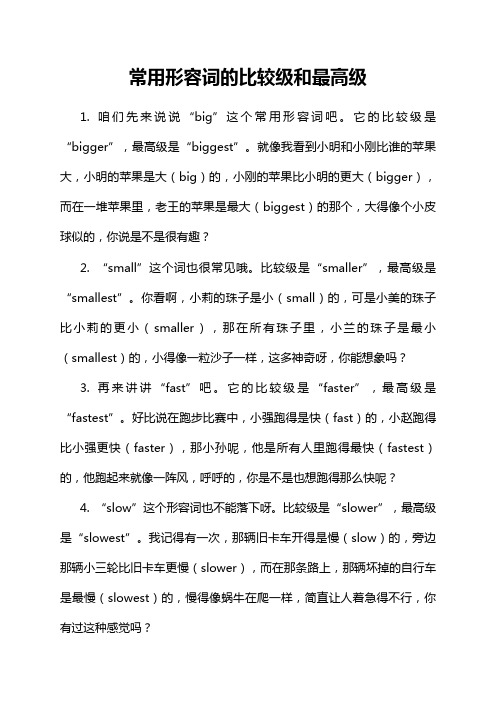
6. “short”也得好好唠唠。比较级是“shorter”,最高级是“shortest”。比如说小伟是矮(short)的,小邓比小伟更矮(shorter),在一群小朋友里,小韩是最矮(shortest)的,矮得像个小蘑菇,哈哈,是不是很可爱的形容呢?
2. “small”这个词也很常见哦。比较级是“smaller”,最高级是“smallest”。你看啊,小莉的珠子是小(small)的,可是小美的珠子比小莉的更小(smaller),那在所有珠子里,小兰的珠子是最小(smallest)的,小得像一粒沙子一样,这多神奇呀,你能想象吗?
3. 再来讲讲“fast”吧。它的比较级是“faster”,最高级是“fastest”。好比说在跑步比赛中,小强跑得是快(fast)的,小赵跑得比小强更快(faster),那小孙呢,他是所有人里跑得最快(fastest)的,他跑起来就像一阵风,呼呼的,你是不是也想跑得那么快呢?
9. “narrow”这个形容词也很常用呢。比较级是“narrower”,最高级是“narrowest”。就像这条小路是窄(narrow)的,那条小巷子比这条小路更窄(narrower),而山间的那条羊肠小道是最窄(narrowest)的,窄得只能一个人侧身通过,走在上面都有点害怕呢,你有走过这么窄的路吗?
我的观点结论就是:常用形容词的比较级和最高级在我们日常生活中的描述中非常有用,它们可以让我们把事物之间的差别更生动形象地表达出来,就像给我们的表达增添了魔法一样。
形容词的比较级和最高级大全
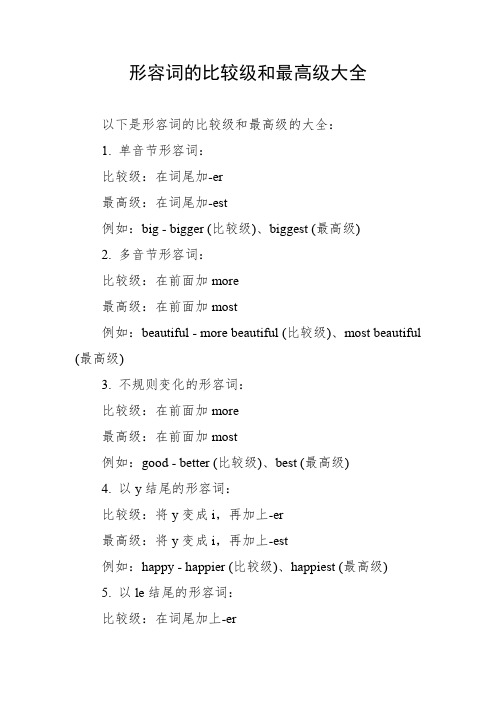
形容词的比较级和最高级大全以下是形容词的比较级和最高级的大全:1. 单音节形容词:比较级:在词尾加-er最高级:在词尾加-est例如:big - bigger (比较级)、biggest (最高级)2. 多音节形容词:比较级:在前面加more最高级:在前面加most例如:beautiful - more beautiful (比较级)、most beautiful (最高级)3. 不规则变化的形容词:比较级:在前面加more最高级:在前面加most例如:good - better (比较级)、best (最高级)4. 以y结尾的形容词:比较级:将y变成i,再加上-er最高级:将y变成i,再加上-est例如:happy - happier (比较级)、happiest (最高级)5. 以le结尾的形容词:比较级:在词尾加上-er最高级:在词尾加上-est例如:possible - more possible (比较级)、most possible (最高级)6. 少数不规则变化的形容词:比较级:在前面加more最高级:在前面加most例如:famous - more famous (比较级)、most famous (最高级)7. 特殊的比较级和最高级:例如:well - better (比较级)、best (最高级)8. 副词的比较级和最高级:比较级:在后面加-er最高级:在后面加-est例如:slowly - more slowly (比较级)、most slowly (最高级)以上是常见的形容词的比较级和最高级,但是也有一些不规则变化的形容词需要记忆。
同时,需要注意的是,有些形容词没有比较级和最高级,如unique。
形容词的比较级和最高级

变化规则大多数形容词和副词有比较级和最高级的变化,即原级、比较级和最高级,用来表示事物的等级差别。
原级即形容词的原形,比较级和最高级有规则变化和不规则变化两种。
(1)单音节词加词尾-er,-est来构成比较级和最高级。
tall(高的) taller tallestgreat(巨大的) greater greatest(2)以不发音的e结尾的单音节词只加-r,-stnice(好的) nicer nicestlarge(大的) larger largestable(有能力的) abler ablest(3)以一个辅音字母结尾的闭音节单音节词,双写结尾的辅音字母,再加-er,-estbig(大的) bigger biggesthot热的) hotter hottestred红色的redder reddest(4)"以辅音字母+y"结尾的双音节词,改y为i,再加-er,-esteasy(容易的) easier easiestbusy(忙的) busier busiest(5)以ly结尾的副词,除early-earlier-earliest,其他都是加more most.Slowly-more slowly-most slowlyBravely-more bravely-most bravelyquickly-more quickly-most quickly(6)少数以-er,-ow结尾的双音节词未尾加-er,-estclever(聪明的) cleverer cleverestnarrow(窄的) narrower narrowest(7)其他双音节词和多音节词在前面加more,most来构成比较级和最高级。
如:important(重要的) more important most importanteasily(容易地) more easily most easily(8)一些词的比较级和最高级,可以加-er或-est,也可以加more或most,如:clever, polite 等。
形容词的比较级和最高级

形容词的比较级和最高级形容词是一类用来描述名词或代词特征的词语,它可以用来表达事物的大小、高度、速度、程度等属性。
在英语中,形容词有三种级别:原级、比较级和最高级。
形容词的比较级和最高级可以用来对两个或多个事物进行比较,以表达它们在某种属性上的差异。
一、形容词的比较级形容词的比较级用来比较两个事物在某个属性上的大小、高度或程度。
一般来说,形容词的比较级可以通过在形容词前加上“-er”来构成。
如果形容词以“e”结尾,只需在后面加上“-r”;如果形容词以辅音字母加“y”结尾,则将“y”变为“i”,再加上“-er”。
例如:1. 高→ 高的→ 更高的(tall → taller)2. 大→ 大的→ 更大的(big → bigger)3. 漂亮→ 漂亮的→ 更漂亮的(beautiful → more beautiful)4. 智慧→ 智慧的→ 更智慧的(intelligent → more intelligent)如果形容词以重读闭音节结尾,且末尾只有一个辅音字母时,则需将最后一个辅音字母双写,并在后面加上“-er”。
例如:1. 适中→ 适中的→ 更适中的(fit → fitter)需要注意的是,有一些形容词的比较级是不规则的,需要单独记忆。
下面是一些常见的不规则比较级形式:1. 好→ 好的→ 更好的(good → better)2. 小→ 小的→ 更小的 (l ittle → less)3. 多→ 多的→ 更多的(many → more)4. 远→ 远的→ 更远的(far → farther/further)形容词的比较级在句子中一般用于比较两个事物之间的差异。
比较级可以与"than"搭配使用,构成比较结构。
例如:1. 这本书比那本书更有趣。
(This book is more interesting than that book.)2. 这座建筑物比那座建筑物高得多。
(This building is much tallerthan that building.)二、形容词的最高级形容词的最高级用来表达一组事物中某个属性的极限。
形容词比较级和最高级

形容词比较级和最高级形容词比较级和最高级用于比较两个或更多事物的特征或性质。
以下是形容词比较级和最高级的形式和用法:比较级的形式:1. 一般形容词的比较级在词尾加上-er,例如:taller(更高的)、faster(更快的)。
2. 以字母e结尾的形容词,在词尾加上-r,例如:nicer(更好的)。
3. 以辅音字母+元音+辅音字母结尾的单音节形容词,双写最后一个辅音字母,再加上-er,例如:bigger(更大的)。
4. 以重读闭音节结尾的双音节及多音节形容词,在词尾加上-er,例如:happier(更快乐的)。
最高级的形式:1. 一般形容词的最高级在词尾加上-est,例如:tallest(最高的)、fastest(最快的)。
2. 以字母e结尾的形容词,在词尾加上-st,例如:nicest(最好的)。
3. 以辅音字母+元音+辅音字母结尾的单音节形容词,双写最后一个辅音字母,再加上-est,例如:biggest(最大的)。
4. 以重读闭音节结尾的双音节及多音节形容词,在词尾加上-est,例如:happiest(最快乐的)。
注意事项:1. 有些形容词的比较级和最高级形式是不规则的,例如:good (better,best)、bad(worse,worst)。
2. 当形容词以-y结尾时,变为-i加-er或-i加-est,例如:funny (funnier,funniest)。
3. 对于很多双音节或多音节的形容词,可以在前面加上more (比较级)或most(最高级)来构建比较级或最高级形式,例如:beautiful(more beautiful,most beautiful)。
使用比较级和最高级时,常用的表达方式有:1. 比较级+than(比……更……):He is taller than his brother.(他比他兄弟更高。
)2. the+最高级+of(最……的……):She is the smartest student in the class.(她是班里最聪明的学生。
形容词比较级和最高级

(2).以辅字母+y结尾的,变y为i,再加-er或-est:easy—easier—easiest happy—happier—h appiest(3).以“辅元辅”结尾的,双写末尾字母,再加-er或-est: big—bigger—biggest常见的还有:thin, fat, wet, red,sadhot—hotter—hottest(4).不规则变化:good—better—bestmany/much—more—most(好坏多少远老)bad—worse—worstlittle(少)—less—leastfar—farther/further—fa rthest/furthestold—older/elder—oldest/eldest(5).其他较短的单词,直接在词尾加-er或-est。
small—smaller short—shorter(6).对于较长的单词,在其前加more,most即可。
popular—more popular—the most populardelicious—more delicious—the most delicious[中考题]1. This T-shirt is not large enough. Please show me a _______one.A.large B. larger C. largest2. She is the ____________ (good) student in her class.注意:以下词为易错,few—fewer new—newer—newest clever—cleverer tired—moretired pleased—more pleased常考知识点二:含有比较级的句型结构1) A is ...than B: A比B更....The earth is biggerthan the moon.2) A do sth ...than B: A比B更....He works harder thanus.[中考题]China has become much__________(strong)than before. We are proud of her.3)Which/ Who is ...., A or B? “A和B哪个/谁更...?”—Because it is ________ winter in Guangzhou.A. as cold asB. much colder thanC. not so coldas D. not colder than3、—What should we do now, Mr. Clark?(2013年黄冈,35)—Please turn to Page _____and look at the _____ picture.A. Twelve; fifthB. Twelfth; fifthC. Twelve; fiveD. Twelfth; five4、—How was your weekend?(2012年,29)—Great! It was my grandfather’s ______ birthday. We enjoyed ourselves.A. seventyB.seventieth C. the seventieth D. seventeenth5、Three students ran faster than Lily in the race. Lily was ________.(2012年,34)A. the fourthB.four C. the third D. three6、—Is Beijing a city with a long history? (2012年,23)— Of course. And after the Olympic Games, __ people came to Beijing for a visit during the vacation.A. thousands ofB. thousandC. five thousandsD. five thousand of二、用所给词的适当形式填空。
形容词的比较级和最高级

形容词的比较级和最高级形容词是用来描述事物的性质或特征的词语。
在表达时,我们可以使用比较级和最高级来表达事物的大小、程度或质量的差异。
比较级比较级用来表示两个或两个以上事物之间的比较。
在英语中,通常在形容词后面加上-er后缀来构成比较级。
1. 当形容词以一个辅音字母结尾时,通常在其后面加上一个辅音字母和-er后缀。
例如:- big(大)→ bigger(更大)- hot(热)→ hotter(更热)2. 当形容词以“e”结尾时,只需添加-r后缀。
例如:- nice(好)→ nicer(更好)- large(大)→ larger(更大)3. 当形容词以“y”结尾时,通常将“y”替换为“i”,再加上-er后缀。
例如:- happy(快乐)→ happier(更快乐)- easy(容易)→ easier(更容易)4. 对于以重读闭音节结尾的形容词,需要双写最后一个辅音字母,并加上-er后缀。
例如:- big(大)→ bigger(更大)- hot(热)→ hotter(更热)最高级最高级用来表示三个或三个以上事物之间的比较,通常在形容词前面加上the和-est后缀来构成最高级。
1. 当形容词以一个辅音字母结尾时,通常在其后面加上一个辅音字母和-est后缀。
例如:- big(大)→ biggest(最大的)- hot(热)→ hottest(最热的)2. 当形容词以“e”结尾时,只需添加-st后缀。
例如:- nice(好)→ nicest(最好的)- large(大)→ largest(最大的)3. 当形容词以“y”结尾时,通常将“y”替换为“i”,再加上-est后缀。
例如:- happy(快乐)→ happiest(最快乐的)- easy(容易)→ easiest(最容易的)4. 对于以重读闭音节结尾的形容词,需要双写最后一个辅音字母,并加上-est后缀。
例如:- big(大)→ biggest(最大的)- hot(热)→ hottest(最热的)通过掌握形容词的比较级和最高级的构成规则,我们可以更准确地描述事物的大小、程度和质量的差异。
英语单词的比较级和最高级

little:形容词比较级littler/less/lesser形容词最高级littlest/least副词比较级less副词最高级leastfar:形容词比较级farther/further形容词最高级farthest/furthest副词比较级farther/further副词最高级farthest/furthestwell:形容词比较级better形容词最高级best副词比较级better副词最高级bestill:形容词比较级worse形容词最高级worst副词比较级worse副词最高级worstmany:形容词比较级more形容词最高级mostbad:形容词比较级worse形容词最高级worstgood:形容词比较级better形容词最高级:bestold:形容词比较级:older/elder形容词最高级:oldest/eldestgood:比较级better最高级the besthot:比较级hotter最高级the hottestheavy:比较级heavier最高级the heaviestfine:比较级finer最高级the finestexciting:比较级more exciting最高级the most exciting bad:比较级worse最高级the worstcreative:比较级more creative最高级the most creative boring:比较级more boring最高级the most boring far:比较级farther/further最高级the farthest/the furthest near:比较级nearer最高级the nearest。
形容词比较级和最高级变化规则
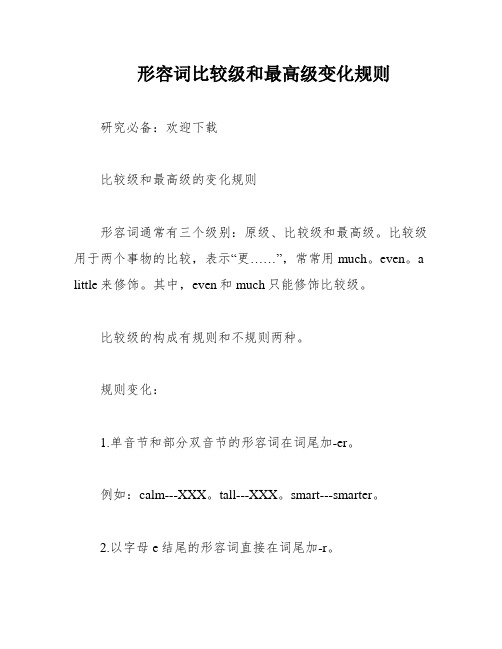
形容词比较级和最高级变化规则研究必备:欢迎下载比较级和最高级的变化规则形容词通常有三个级别:原级、比较级和最高级。
比较级用于两个事物的比较,表示“更……”,常常用much。
even。
a little来修饰。
其中,even和much只能修饰比较级。
比较级的构成有规则和不规则两种。
规则变化:1.单音节和部分双音节的形容词在词尾加-er。
例如:calm---XXX。
tall---XXX。
smart---smarter。
2.以字母e结尾的形容词直接在词尾加-r。
例如:nice---nicer。
fine---finer。
large---larger。
3.以辅音字母+y结尾的形容词,变y为i,再加-er。
例如:early---earlier。
happy---happier。
busy---busier。
4.以重读闭音节的单个辅音字母结尾的形容词,双写辅音字母,再加-er。
例如:big---bigger。
XXX---XXX。
hot---hotter。
5.多音节或部分双音节的形容词在原级前面加more。
例如:popular---more popular。
important---more important。
不规则变化:有少数形容词的比较级变化是不规则的,如:good---better。
bad/ill---worse。
many/much---more。
little---less。
far---farther/further。
old---older/elder。
比较级的用法:当需要比较两个人或事物(A和B)时,我们需要用到形容词(副词)的原级或比较级。
1.表达“A和B一样”,用as…as的结构。
公式:A+be动词+as+形容词原级+as…+B,A+实义动词+as+副词原级+as…+B。
例如:I am as tall as you.我和你一样高。
He runs as fast as I.他跑得和我一样快。
2.表达“A不如B”,用not as…as的结构。
形容词比较级和最高级
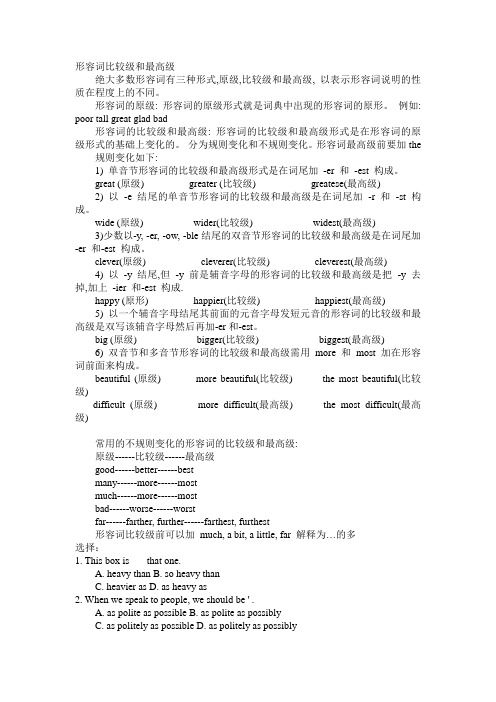
形容词比较级和最高级绝大多数形容词有三种形式,原级,比较级和最高级, 以表示形容词说明的性质在程度上的不同。
形容词的原级: 形容词的原级形式就是词典中出现的形容词的原形。
例如: poor tall great glad bad形容词的比较级和最高级: 形容词的比较级和最高级形式是在形容词的原级形式的基础上变化的。
分为规则变化和不规则变化。
形容词最高级前要加the 规则变化如下:1) 单音节形容词的比较级和最高级形式是在词尾加-er 和-est 构成。
great (原级) greater (比较级) greatese(最高级)2) 以-e 结尾的单音节形容词的比较级和最高级是在词尾加-r 和-st 构成。
wide (原级) wider(比较级) widest(最高级)3)少数以-y, -er, -ow, -ble结尾的双音节形容词的比较级和最高级是在词尾加-er 和-est 构成。
clever(原级) cleverer(比较级) cleverest(最高级)4) 以-y 结尾,但-y 前是辅音字母的形容词的比较级和最高级是把-y 去掉,加上-ier 和-est 构成.happy (原形) happier(比较级) happiest(最高级)5) 以一个辅音字母结尾其前面的元音字母发短元音的形容词的比较级和最高级是双写该辅音字母然后再加-er和-est。
big (原级) bigger(比较级) biggest(最高级)6) 双音节和多音节形容词的比较级和最高级需用more 和most 加在形容词前面来构成。
beautiful (原级)more beautiful(比较级) the most beautiful(比较级)difficult (原级) more difficult(最高级) the most difficult(最高级)常用的不规则变化的形容词的比较级和最高级:原级------比较级------最高级good------better------bestmany------more------mostmuch------more------mostbad------worse------worstfar------farther, further------farthest, furthest形容词比较级前可以加much, a bit, a little, far 解释为…的多选择:1. This box is___ that one.A. heavy thanB. so heavy thanC. heavier asD. as heavy as2. When we speak to people, we should be ' .A. as polite as possibleB. as polite as possiblyC. as politely as possibleD. as politely as possibly3. This book is____ that one, but____ than that one.A. as difficult as; expensiveB. as more difficult as; more expensiveC. as difficult as; more expensiveD. more difficult as; as expensive4. I think the story is not so ___ as that one.A. interestingB. interestedC. more interestingD. most interesting5. His father began to work____ he was seven years old.A. as old asB. as early asC. sinceD. while( )6. I think science is _ than Japanese.A. much importantB. importantC. much more importantD. more much important( ) 7 This pencil is___ than that one.A. longestB. longC. longerD. as long( ) 8 My mother is no ___ young.A. shorterB. longerC. littleD. few( ) 9 These children are ____ this year than they were last year.A. more tallB. more tallerC. very tallerD. much taller( ) 10 It was very hot yesterday, but it is___ today.A. even hotterB. more hotterC. much more hotD. much hot( ) 11. Mrs Black has got____ instead of getting any better.A. more badB. a little worseC. much badlyD. a lot of worse( ) 12. His father is____than his mother. ;A. older four yearsB. as four years olderC. four years olderD. bigger four years ( ) 13. Maths is more popular than____.A. any other subjectB. all the subjectsC. any subjectD. other subject( ) 14. China is larger than ____ in Africa.A. any other countryB. other countriesC. the other country J 1%D. any country ( ) 15. Tom is stronger than ___ in his class.A. any other boyB. any boysC. any boyD. other boy( ) 16. When spring comes, it gets____.A. warm and warmB. colder and colderC. warmer and warmerD. shorter and shorter( ) 17. By and by, ____ students in our class came to like English.A. more and moreB. much and muchC. many and manyD. less and least ( ) 18. At last he began to cry ___.A. hard and hardB. more hard and more hardC. harder and harderD. less hard and less harder( ) 19. When spring comes the days get ____ and nights ____.A. short; longB. long; shortC. longer; shorterD. shorter; longer( ) 20. Which do you like ___, tea or coffee?A. wellB. betterC. bestD. most( ) 21. This work is ____ for me than for you.A. difficultB. most difficultC. much difficultD. more difficult ( ) 22. Which do you think tastes ____, the chicken or the fish?A. goodB. betterC. bestD. well( ) 23. The Great Pyramid is about 137 metres high today, but it was onceA. higherB. highestC. high tooD. more high( ) 24. Don't you think it ______ not to write the letter?A.well ,B. betterC. bestD. good填空:1. Gold(黄金) is ______ (little) useful than iron(铁).2. My sister is two years _______ (old ) than I.3. John’s parents have four daughters, and she is the _____ (young) child.4. The _____ (cheap) bags are the not usually the best ones.5. The short one is by far _______ (expensive) of the five.6. The boy is not as ______ (interesting) as his brother.7. Dick sings _____ (well), she sings ______(well) than John, but Mary sings______(well) in her class.8. She will be much ______ (happy) in her mew house.写出下列形容词与副词的比较级与最高级形式:long_____ ______ wide ______ _______ fat ____ _____heavy____ ______ slow ______ _______ few ____ _____far____ ____ happy_____ _____ good____ ____用适当形式填空:1. Bob is _________ ( young ) than Fred but ___________ (tall) than Fred.2. Yingtian is not as ___________ (tall) as Yongxian.3. Almost all the students' faces are the same but Li Deming looks _______ (fat) than before the holidays,4. Which is _________ (heavy), a hen or a chicken?5. -- How _________ (tall) is Sally?-- She' s 1.55 metres ________ (tall).--What abod Xiaoling?-- She' s only 1.40 metres ________ (tall).She is much _______ (short) than Sally.She is also _______ (short) girl in the class.6. He is ______ (bad) at learning maths. He is much _______ (bad) at Chinese and he is the _________ (bad) at English.7. Annie says Sally is ________ (kind) person in the world.8. He is the _________(friendly) people in the class, I think.9. A dictionary is much _________ (expensive) than a story-book.10. An orange is a little ______ (big) than an apple, but much ________ (small) than a watermelon.11. The Changjiang River is _______ (long) river in China.12. Sue is a little ________ (beautiful) than her sister.13. My room is not as _________ (big) as my brother' s.14. --How difficult is physics?--I' m not sure.-- Is it ________ (difficult) than maths?-- I don' t think so.15. -- Annie plays the piano very ___________ (well).-- Sue plays it _____ (well) than Annie. And Sally plays it the __________ (well) among(在…之间) them.16. Saturday is my _________ (busy) day in a week.17. Her mother is getting ____________(fat) and ________ (fat).18. I think it' s too expensive. I' d like a _____________ (cheap) one.19. He comes to school much ____________ (early) than I.20. This book is not as _____________ (interesting) as that one.21. Your classroom is __________(wide) and ___________(bright) than ours.22. The ________ (much), the ____________ (good).23. Nowadays English is __________( important ) than any other subject, I think.24. Most of the students think a lion is much ________(dangerous) than a bear and it is __________ (dangerous) animal in the world.。
形容词的比较级和最高级

形容词的比较级和最高级形容词是描述性词语,用于修饰名词或代词,用来表达人、事物或概念的特征和属性。
当我们想要对事物进行比较时,比较级和最高级就派上了用场。
比较级用来比较两个人或物之间的差异,表示“更……”、“比……更……”之意。
形容词的比较级有规律和不规律两种形式。
规律比较级的构成:在形容词后加上“er”。
如:1. 高(tall)- 比较高(taller)2. 富有(rich)- 更富有(richer)3. 长(long)- 更长(longer)当形容词以“e”结尾时,只需在其后加上“r”。
例如:1. 大(large)- 更大(larger)2. 短(short)- 更短(shorter)如果形容词以“辅音字母+元音字母+辅音字母”结尾,且重读最后一个音节时,需双写末尾的辅音字母,并加上“er”。
如:1. 重(heavy)- 更重(heavier)2. 热(hot)- 更热(hotter)不规律比较级则需要变化形态,例如:1. 好(good)- 更好(better)2. 多(many)- 更多(more)3. 少(few、little)- 更少(fewer、less)另外,当比较级前面有“than”时,表示与之前的人或物相比更……。
例如:1. 我比我弟弟更高。
I am taller than my younger brother.2. 这只猫比那只狗更可爱。
This cat is cuter than that dog.最高级用来表示同一类人或事物中最高的一项,表示“最……”或“最高的”。
构成最高级形容词,需要在形容词前加上“the”并在后面加上“est”。
如:1. 高(tall)- 最高的(the tallest)2. 富有(rich)- 最富有的(the richest)3. 长(long)- 最长的(the longest)当形容词以“e”结尾时,只需在其前加上“th”。
例如:1. 大(large)- 最大的(the largest)2. 短(short)- 最短的(the shortest)如果形容词以“辅音字母+元音字母+辅音字母”结尾,且重读最后一个音节时,需双写末尾的辅音字母,并加上“est”。
形容词比较级和最高级more, most

形容词比较级和最高级more, most最高级是英语语法常用的简单的但是又能显示出英语实力的知识,作文里多用这个能提分。
小编在这里整理了相关知识,快来学习学习吧!形容词比较级和最高级more, most形容词比较级和最高级的规则变化2.形容词比较级和最高级more, most形式。
大多数双音节、三音节以及三音节以上的形容词采用“more+原级”构成比较级形式,“most+原级”构成最高级形式。
如下:2.1一般双单音节形容词careful原级→more careful比较级→most careful最高级active原级→more active比较级→most active最高级useful原级→more useful比较级→most useful最高级2.2三单音节以及三音节以上的形容词difficult原级→more difficult比较级→most difficult最高级interesting原级→more interesting比较级→most interesting最高级2.3-ed结尾的形容词tired原级→more tired比较级→most tired最高级worried原级→more worried比较级→most worried最高级欢迎转发~~~发动大家来做作业,学英语~英语作业20180413一、选择填空35.—How do you get to your office every day? Do you walk?—It’s ___ far to walk. I’lltake the subway.A.soB.quiteC.tooD.still36.—Are you leaving for home soon?—Oh,I’ve ___ got a few days in Shanghai. I haven’t finished my job here ___.A.still, yetB.already, nearlyC.still, alreadyD.yet, almost上一期英语作业20180412参考答案:33-34:BB二、分析句子的英语语法结构,并翻译成中文RAF Akrotiri in Cyprus is at the sharp end of the British military presence in the eastern Mediterranean. Rumour is rife on the island that the installation would be targeted if Russia were to retaliate in the event of US-led military action in Syria.【卫报The Guardian】高一英语必修一必背句型1) It was the first time in a year and a half that I had seen the night face to face. (从句时态用完成时) 这是我一年半以来第一次目睹夜晚。
形容词的比较级与最高级的例词

形容词的比较级与最高级的例词形容词是用来描述人、事物、情感和行为特征的词语,而形容词的比较级和最高级则是用来对不同事物或人的特征进行比较和排序。
在英语中,形容词的比较级和最高级有一定的构造规则和用法。
下面将以几个常见的形容词为例,详细介绍形容词的比较级和最高级。
1. Tall(高):- 比较级:taller(更高的)- 最高级:tallest(最高的)举例:- My brother is taller than me.(我的哥哥比我高)- John is the tallest student in our class.(约翰是我们班最高的学生)2. Bright(明亮的):- 比较级:brighter(更明亮的)- 最高级:brightest(最明亮的)举例:- The sun is brighter than the moon.(太阳比月亮更明亮)- This room has the brightest light.(这个房间有最亮的光线)3. Fast(快的):- 比较级:faster(更快的)- 最高级:fastest(最快的)举例:- The cheetah is faster than any other animal.(猎豹是比其他动物都更快的)- Usain Bolt is the fastest sprinter in the world.(尤塞恩·博尔特是世界上最快的短跑运动员)4. Delicious(美味的):- 比较级:more delicious(更美味的)- 最高级:most delicious(最美味的)举例:- The cake is more delicious than the cookies.(蛋糕比饼干更美味)- This restaurant serves the most delicious food in town.(这家餐厅提供镇上最美味的食物)5. Interesting(有趣的):- 比较级:more interesting(更有趣的)- 最高级:most interesting(最有趣的)举例:- The book is more interesting than the movie.(这本书比电影更有趣)- The history museum was the most interesting place we visited.(历史博物馆是我们参观的最有趣的地方)通过上述例子,我们可以看到形容词的比较级和最高级的构造方式。
形容词副词的比较级和最高级总结
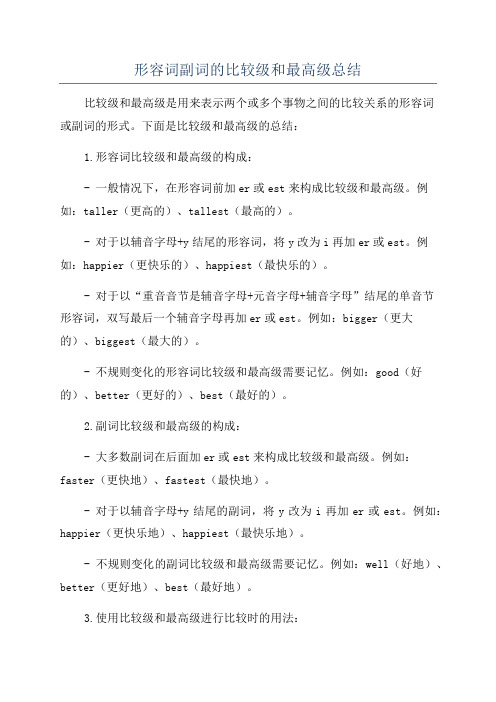
形容词副词的比较级和最高级总结比较级和最高级是用来表示两个或多个事物之间的比较关系的形容词或副词的形式。
下面是比较级和最高级的总结:1.形容词比较级和最高级的构成:- 一般情况下,在形容词前加er或est来构成比较级和最高级。
例如:taller(更高的)、tallest(最高的)。
- 对于以辅音字母+y结尾的形容词,将y改为i再加er或est。
例如:happier(更快乐的)、happiest(最快乐的)。
- 对于以“重音音节是辅音字母+元音字母+辅音字母”结尾的单音节形容词,双写最后一个辅音字母再加er或est。
例如:bigger(更大的)、biggest(最大的)。
- 不规则变化的形容词比较级和最高级需要记忆。
例如:good(好的)、better(更好的)、best(最好的)。
2.副词比较级和最高级的构成:- 大多数副词在后面加er或est来构成比较级和最高级。
例如:faster(更快地)、fastest(最快地)。
- 对于以辅音字母+y结尾的副词,将y改为i再加er或est。
例如:happier(更快乐地)、happiest(最快乐地)。
- 不规则变化的副词比较级和最高级需要记忆。
例如:well(好地)、better(更好地)、best(最好地)。
3.使用比较级和最高级进行比较时的用法:- 比较级用于比较两个事物。
例如:She is taller than her sister.(她比她妹妹高。
)- 最高级用于比较三个或三个以上事物。
例如:He is the tallest boy in the class.(他是班上最高的男孩。
)- 当比较的对象是不可数名词时,使用more或most来构成比较级和最高级。
例如:She has more money than him.(她比他有更多的钱。
形容词的比较级和最高级
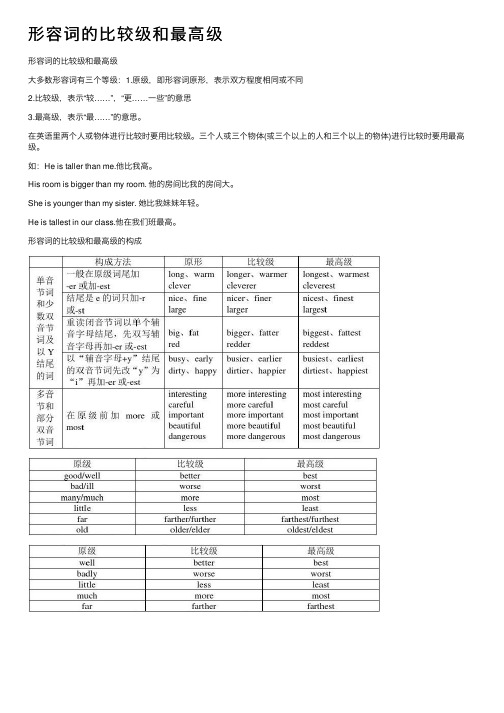
形容词的⽐较级和最⾼级形容词的⽐较级和最⾼级⼤多数形容词有三个等级:1.原级,即形容词原形,表⽰双⽅程度相同或不同2.⽐较级,表⽰“较……”,“更……⼀些”的意思3.最⾼级,表⽰“最……”的意思。
在英语⾥两个⼈或物体进⾏⽐较时要⽤⽐较级。
三个⼈或三个物体(或三个以上的⼈和三个以上的物体)进⾏⽐较时要⽤最⾼级。
如:He is taller than me.他⽐我⾼。
His room is bigger than my room. 他的房间⽐我的房间⼤。
She is younger than my sister. 她⽐我妹妹年轻。
He is tallest in our class.他在我们班最⾼。
形容词的⽐较级和最⾼级的构成形容词的⽤法:⼀、形容词原级的⽤法表⽰双⽅程度相同(即年龄、⾼矮等等)或不同时⽤形容词原级。
肯定式⽤as……as(和/与……⼀样)表⽰;否定式⽤not as……as或not so……as(和/与……不⼀样)表⽰。
as……as的中间⽤形容词和副词原级。
She is as tall as I.她和我⼀样⾼。
Lesson Five is as difficult as Lesson Four.第五课和第四课同样难。
He is not as old as you.他没有你那么⽼。
Lily is not as careful as Linda.莉莉不如琳达细⼼。
1.肯定句的句式结构是:A+be动词+as+形容词原级+as+B(表⽰A、B两者⽐较程度相同)。
This film is as interesting as that one.这部电影和那部电影⼀样有趣。
Her handwriting is as good as his.她的书写于他的⼀样好。
Mary is as careful as Linda.玛丽和琳达同样细⼼。
2.否定句的句式结构是:A+be动词+not+as+形容词原级+as+B(=A+be动词+not+so+形容词原级+as+B)(表⽰A、B两者程度不同,即A不如B那么……) Spring is not as/so cold as winter.春天不像冬天那么冷。
英语中的形容词有哪些比较级和最高级

英语中的形容词有哪些比较级和最高级?英语中的形容词比较级和最高级通常是通过在形容词前加上不同的前缀来构成的。
以下是常见的形容词比较级和最高级形式:1. 一般形式:形容词的原级(Positive Degree)是形容词的基本形式,用于描述事物的基本特征。
例如:big(大)、beautiful(美丽)、fast(快)等。
2. 比较级(Comparative Degree):用于比较两个事物的性质、大小、品质等。
形成比较级的一般规则是在形容词前加上"-er"或者在形容词前加上"more"。
例如:- big(大)- bigger(更大)- beautiful(美丽)- more beautiful(更美丽)- fast(快)- faster(更快)3. 最高级(Superlative Degree):用于比较三个或更多事物之间的性质、大小、品质等,表示最高程度。
形成最高级的一般规则是在形容词前加上"-est"或者在形容词前加上"most"。
例如:- big(大)- biggest(最大)- beautiful(美丽)- most beautiful(最美丽)- fast(快)- fastest(最快)需要注意的是,有些形容词的比较级和最高级形式是不规则的,需要记住其特殊形式。
例如:- good(好)- better(更好)- best(最好)- bad(坏)- worse(更坏)- worst(最坏)- much(多)- more(更多)- most(最多)以上是英语中常见的形容词比较级和最高级形式。
掌握这些形式可以帮助我们在表达时更准确地描述事物的特征和进行比较。
形容词的比较级和最高级

形容词的比较级和最高级形容词的比较级和最高级一、比较级1.定义:比较级是用来比较两个事物之间的差异或程度。
通常,我们使用形容词的比较级来表示“更”或“较”的概念。
2.构成规则:大多数形容词的比较级可以通过加-er后缀来构成。
例如:good - betterbad - worseold - older3. 使用方法:在句子中,比较级通常与than或than any other +单数名词连用。
例如:John is younger than his brother. 约翰比他的哥哥年轻。
Jane is more intelligent than anyone else in the class. 简比班上其他任何人都聪明。
二、最高级1.定义:最高级用于描述一个事物在特定范围内是最高或最大的。
2.构成规则:大多数形容词的最高级可以通过加-est后缀来构成。
例如:good - bestbad - worstold - oldest3. 使用方法:在句子中,最高级通常与of all或in + 范围连用。
例如:Tom is the tallest in his class. 汤姆是他们班上最高的。
Jane is the most intelligent student in the class. 简是班上最聪明的学生。
练习:请根据所给答案纠正你的错误,并重新做一遍。
1.She sings ___in her class. (beautiful)2.答案:best3.He is ___than his brother. (tall)4.答案:taller5.This book is ___than that one. (interesting)6.答案:more interesting7.The ___of all the cars here is the red one. (beautiful)8.答案:most beautiful9.She studies harder than any other student ___class. (in)。
- 1、下载文档前请自行甄别文档内容的完整性,平台不提供额外的编辑、内容补充、找答案等附加服务。
- 2、"仅部分预览"的文档,不可在线预览部分如存在完整性等问题,可反馈申请退款(可完整预览的文档不适用该条件!)。
- 3、如文档侵犯您的权益,请联系客服反馈,我们会尽快为您处理(人工客服工作时间:9:00-18:30)。
3)比较级前的修饰词:much, even甚至, (by) far大大地, a little有点, a bit有点, still, yet, a lot很,非常常考知识点一:形容词的比较级和最高级的构成(1).以不发音的e结尾,直接加-r或-st:nice—nicer—nicest large—larger—largest(2).以辅字母+y结尾的,变y为i,再加-er或-est:easy—easier—easiest happy—happier—happiest(3).以“辅元辅”结尾的,双写末尾字母,再加-er或-est: big—bigger—biggest常见的还有:thin, fat, wet, red, sadhot—hotter—hottest(4).不规则变化: good—better—best many/much—more—most (好坏多少远老) bad—worse—worst little(少)—less—leastfar—farther/further—farthest/furthestold—older/elder—oldest/eldest错,few—fewer new—newer—newest clever—cleverer tired—moretired pleased—more pleased常考知识点二:含有比较级的句型结构1) A is ...than B: A比B更.... The earth is bigger than the moon.2) A do sth ...than B: A比B更.... He works harder than us.【中考题】China has become much__________(strong)than before. We are proud of her.3)Which/ Who is ...., A or B? “A和B哪个/谁更...?”4)... and ... “越“越来越...”When spring comes, the days are getting longer and longer.5、Three students ran faster than Lily in the race. Lily was ________.(2012年佛山,34)A. the fourthB. fourC. the thirdD. three6、—Is Beijing a city with a long history? (2012年湛江,23)— Of course. And after the Olympic Games, __ people came to Beijing for a visit during the vacation.A. thousands ofB. thousandC. five thousandsD. five thousand of二、用所给词的适当形式填空。
1、She will be much___________ (happy) in her new house.2、Of the two girls, I find Lucy the ___________ (clever).3、---How _______(tall) is Sally?---She’s 1.55 meters _______(tal l). What about Xiaoling?---She’s only 1.40 meters ________(tall). She is much _________(short) than Sally. She is also the ________(short) girl in the class.4、She is one of the ___________(friendly) people in the class, I think.5、Which is ___________(heavy), a hen or a chicken?6、The __________(much), the _________(good).7、Your classroom is __________(wide) and __________(bright) than ours.8、My sister is two years_________ (old) than me.9、John’s parents have 3 sons, and John is the _________ (young) child.10、The cheapest bag is not always the _________ (bad) one.11、Which officer chair is _________(expensive), the red one or the black one?12、Tom has _________ (good) marks in English than Alice.13、Beijing is the _________ (big) city in China.14、Who has _________ (many) stamps, Jim, Helen or Mary?三、根据中文提示完成下列句子。
1.今天比昨天热多了。
It is much _________ today _________ it was yesterday.2.我的书包比她的书包重。
My bag is _________ _________ hers.3.你们班上谁最受欢迎?Who is_________ _________ _________ student in your class?4.我们用更低的价钱买到了电脑,比预期中的要幸运。
We bought the computer at a _________ _________ and we were _________ than we expected.Step6:课后作业一、用所给词的适当形式填空。
1. Thank you for _________ (help) me!2. She went to see a film without _________ (tell) her parents.3. Every day he spends an hour _________ (practise) the piano.4. Miss Smith told me how _________ (use) a dictionary.5. The little boy used _________ (be) a bad student. But he studies well now.6. We can use computers __________ (search) the Internet.7. The big dog can do many things like _________ (catch) thieves.8. The little girl is good at _________ (play) the piano.9. Are you able _________ (finish) your homework in an hour.10. This computer was __________ (make) in China.二、完型填空。
Computers are very useful and helpful today. We middle school students like computers very much. Some __1___ use them to play computer games, while some use them to __2___ useful information.My father bought a __3___ as a birthday present for me last year. It became my best friend. I'd like to__4____ on the computer as soon as I got back home. At weekends, I often played games __5___ with my friends. I made a lot of friends on the Internet. But my eyesight became __6___, and I was unable to __7___ myhomework without my glasses. My father took away the computer. He told me that I should __8___ my eyes.The computer is _9___ used nowadays. It can not only help us work, but also offer us all kinds of games. But if we spend too much time ___10___ in front of the computer, it will do harm to our health. We should make good use of it.( ) 1. A. students B. teachers C. doctors D. workers( ) 2. A. look at B. look after C. look up D. look to( ) 3. A. machine B. book C. toy D. computer( ) 4. A. stand B. play C. take D. jump( ) 5. A. in line B. online C. with line D. out of line( ) 6. A. better and better B. brighter and brighterC. stronger and strongerD. worse and worse( ) 7. A. cut B. finish C. kill D. say( ) 8. A. get along well with B. take care of C. learn about D. be interested in ( ) 9. A. loudly B. widely C. narrowly D. quietly( ) 10. A. sitting B. sleeping C. eating D. singing三、阅读理解。
